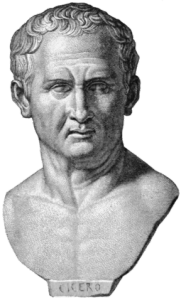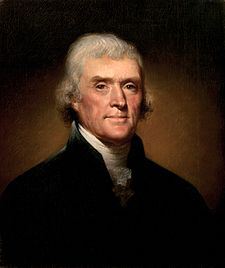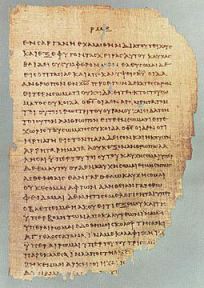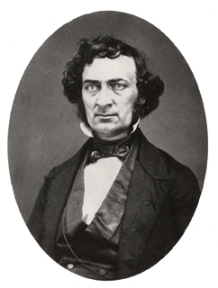
Marcus Tullius Cicero
Here are some selections from On the Nature of the Gods penned in 45 BC by the Roman statesman and philosopher Marcus Tullius Cicero. In the excerpts Cicerco presents the Teleological Argument, or the Argument from Design, for the existence of God. The selections come from Book II, chapters XXXVII, XLIV, and XLVII.
——————-
Who would not deny the name of human being to a man who, on seeing the regular motions of the heaven and the fixed order of the stars and the accurate interconnexion and interrelation of all things, can deny that these things possess any rational design, and can maintain that phenomena, the wisdom of whose ordering transcends the capacity of our wisdom to understand it, take place by chance? Continue reading
 reveals his religious sentiments, pulling no punches about his revulsion to Calvinism and the trinitarian dogma (he calls it “tritheism”). In the course of the letter, he also endorses the teleological argument, or argument from design, making a rather eloquent presentation of the argument. Agree or disagree with the views he expresses (I disagree with his denial of the virgin birth of Jesus), the letter is a fascinating piece by any account. What strikes me most is the vehemence of his denunciation of Calvinism and that simply a mere mention of Calvin’s name from Adams (in his previous letter to Jefferson), and not even in a theological context, was enough to set Jefferson off into such a denunciation. Adams had only quoted Calvin’s exclamation to God during his infirmity late in life as a fitting expression of Adams own feeling toward the infirmity that beset him at the time he wrote the letter to Jefferson.
reveals his religious sentiments, pulling no punches about his revulsion to Calvinism and the trinitarian dogma (he calls it “tritheism”). In the course of the letter, he also endorses the teleological argument, or argument from design, making a rather eloquent presentation of the argument. Agree or disagree with the views he expresses (I disagree with his denial of the virgin birth of Jesus), the letter is a fascinating piece by any account. What strikes me most is the vehemence of his denunciation of Calvinism and that simply a mere mention of Calvin’s name from Adams (in his previous letter to Jefferson), and not even in a theological context, was enough to set Jefferson off into such a denunciation. Adams had only quoted Calvin’s exclamation to God during his infirmity late in life as a fitting expression of Adams own feeling toward the infirmity that beset him at the time he wrote the letter to Jefferson. 
